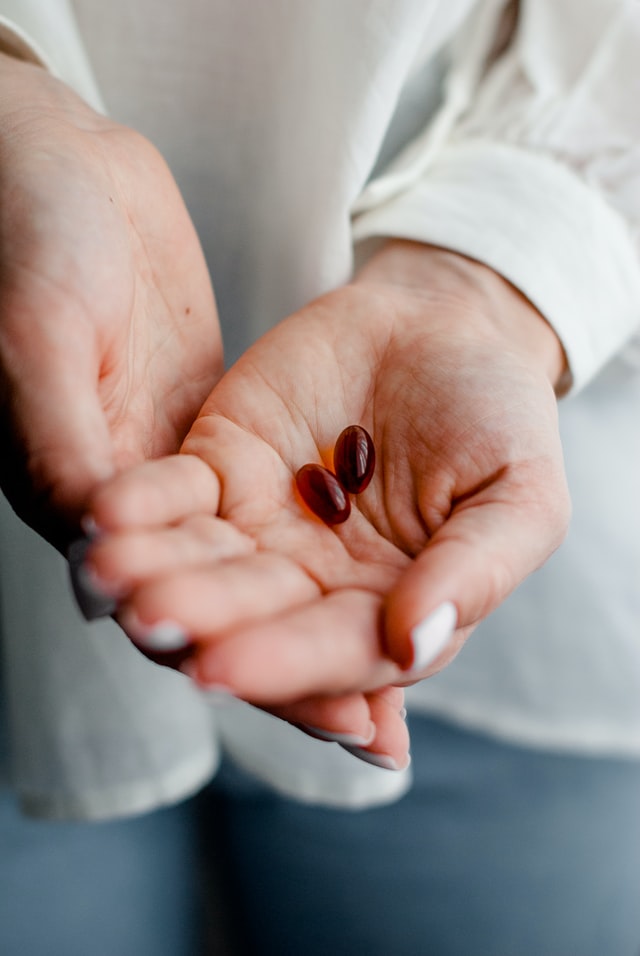


With gut health being all the rage, you may be considering adding a daily probiotic to your routine. We know that these beneficial bacteria have numerous scientific-backed benefits, like supporting immunity, as 70-80 percent of our immune system resides in our gut, digestion, and so much more. To get the best bang for your buck, and maximize their benefits, it’s common to wonder, when is the best time to take a probiotic? We know to take our fat-soluble vitamins (A, D, E, and K) with our meals as it’s absorbed better, but does that ring true for probiotic bacteria?
When To Take Your Probiotics
In short, it’s ideal to consume your probiotics when your stomach acid levels are lower, meaning the concentration, not the pH. This can help ensure that these thriving microscopic bacteria can survive and colonize in the gut, where they can then support your gut microbiome and immune system. So, when is that exactly? Due to everyone being different, this answer varies. While the time of day doesn’t really matter, having an empty stomach does. Avoid taking a probiotic right before or directly after you eat. Seeing as our stomachs churn out more acid to help digest our food, we don’t want to interfere with that or have the probiotic bacteria die in the process. One study found that probiotics administered thirty minutes before a meal or at the beginning of a meal were much more likely to survive than probiotics given thirty minutes after a meal when digestion is rapidly occurring.
Why Does Timing And Quality Matter?
When it comes to probiotics, it’s all about survivability. Inside, billions of fragile microorganisms must overcome various obstacles like the manufacturing process, shelf life, if they need to be refrigerated, and the environment in your stomach to reach your intestines, where most of their job is done. So with this said, it’s easy to see why timing does play a role.
In terms of quality, I like a bargain just as much as the next, but buying a cheap probiotic supplement won’t do you any favors. In general, if a product seems too good to be true, it most likely is. It’s impossible to have high-quality, clinically studied ingredients at a reduced price. Like any supplement, the quality matters, and that triples for probiotics. Typically, commercial brands lack the ability and technology to accurately pinpoint specific strains and how much of that strain each dose contains. Meaning, you could be paying for an ineffective or potentially harmful product or dosage.
To help better determine if a probiotic is worth your while, check for companies that use probiotic strains that have been specifically studied in clinical trials at a dose similar to or the exact same that was used in the study. This is one of the only ways to guarantee a probiotic’s effectiveness. It’s also worth noting that when supplements contain an exact number of organisms, this number will eventually diminish. Probiotics are living organisms and can die, especially if that supplement has been sitting on a warehouse shelf or your grocery store shelf for quite some time. Temperature also matters. If a probiotic is being stored in a refrigerator when you purchase, it’s likely that those organisms might already be dead. This is mainly due to the product not continuously being stored at lower temperatures, in warehouses, or shipping trucks when they get transported. Not to mention, companies have to produce probiotics with a higher CFU (colony-forming unit) count in each capsule, just to safeguard the label potency through the expiration date, or in the case of probiotics, the manufacturing date, from two years from that. Sadly, many commercial brands don’t measure up, are unstable in stomach acid, and quality control precautions aren’t intact. Moisture can also be an issue as it reduces a probiotic’s efficacy. Typically, a higher-quality probiotic, one that uses clinically studied strains, can endure stomach acid, releasing its contents within the small intestine, where a more alkaline environment awaits.
To mitigate this, buy from a reputable health care professional or a brand that submits its products for multiple rounds of quality testing. This includes testing its raw ingredients and their final product. Some brands are now using time-released or enteric-coated capsules that are more likely to withstand harsh stomach acid.
The Takeaway
To better optimize the effects of your probiotic, it’s best to take them on an empty stomach when your stomach acid levels are at their absolute lowest. This can be right when you wake up in the morning, 30 minutes before a meal, or a few hours after your last meal, before you go to bed. The quality of your probiotic also matters to ensure maximum benefits. Look for brands that use clinically studied strains and submit their products for multiple rounds of testing.
Related Stories:
Prebiotics Versus Probiotics: Do You Need Both For A Healthy Gut?
プロバイオティクスを服用する最適なタイミングとは?
腸内環境を整える事が大流行しているので、あなたのルーチンにはプロバイオティクスの摂取が既に組み込まれているかもしれません。私たちの免疫システムの70-80%が腸、つまり消化器に存在するので、これらの有益なバクテリアには免疫をサポートするなど、科学的に裏付けられた多くの利点があることはご存知でしょう。これらの利益を最大にするために、プロバイオティクスを服用する最適な時期はいつでしょう?脂溶性ビタミン(A、D、E、K)は吸収が良いので、食事と一緒に摂取することはわかっていますが、それはプロバイオティクス細菌にも当てはまるでしょうか?
プロバイオティクスをいつ服用するか
胃酸のレベルが低い時、つまりpHではなく濃度が低い時に、プロバイオティクスを摂取するのが理想的です。これは、繁殖している微細な細菌が腸内で生き残り、コロニーを形成し、腸内細菌叢と免疫系をサポートできるようにするために役立ちます。それで、それは正確にいつでしょう?人それぞれで違うので、この答えは異なります。時間帯はそれほど重要ではありませんが、お腹が空いていることは重要です。食事の直前または直後にプロバイオティクスを服用することは避けてください。胃が食物を消化するのを助けるためにより多くの酸をかき回すのを妨害したり、その過程でプロバイオティクス細菌を死なせたりはしたくありません。ある研究は、食事の30分前または食事の開始時に投与されたプロバイオティクスは、食事の30分後に投与されたプロバイオティクスよりも生存する可能性がはるかに高いことを発見しました。
タイミングと品質が重要なのはなぜですか?
プロバイオティクスに関して言えば、それはすべて生存可能性に関するものです。内部では、何十億もの壊れやすい微生物が、製造プロセス、冷蔵が必要な場合の貯蔵寿命、腸に到達するまえの胃の環境など、さまざまな障害を克服する必要があります。
私は掘り出し物が好きです。しかし安いプロバイオティクスサプリメントを買うことはあなたに何の恩恵も与えないでしょう。一般に、製品が良すぎて信じがたい場合、それは当たっているでしょう。高品質で臨床的に研究された成分を低価格で手に入れることは不可能だからです。他のサプリメントと同様に、品質が重要です。通常、商用ブランドには、特定の菌株と、各用量に含まれるその菌株の量を正確に特定する能力と技術が欠けています。つまり、効果がない、または潜在的に有害な製品や投与量にお金を払っている可能性があります。
プロバイオティクスが価値があるかどうかをよりよく判断する事を助けるために、研究で使用されたのと同じ、またはまったく同じ用量の臨床試験で特に研究されたプロバイオティクス株を使用している会社をチェックしてください。これは、プロバイオティクスの有効性を保証する唯一の方法の1つです。サプリメントに正確な数の生物が含まれている場合、この数は最終的には減少することにも注意してください。プロバイオティクスは生き物であり、特にそのサプリメントがかなり長い間倉庫の棚や食料品店の棚に置かれている場合、死ぬ可能性があります。温度も重要です。購入時にプロバイオティクスが冷蔵庫に保管されている場合、それらの生物はすでに死んでいる可能性があります。これは主に、製品が輸送時に低温で、倉庫に、または輸送トラックに継続的に保管されていないことが原因です。言うまでもなく、企業は、有効期限まで、またはプロバイオティクスの場合は製造日から2年後までラベルの効力を保護するために、各カプセルでより多くのCFU(コロニー形成単位)数のプロバイオティクスを製造する必要があります。悲しいことに、多くの商用ブランドでは測定できず、胃酸が不安定であり、品質管理の予防措置が十分ではありません。水分もプロバイオティクスの効能を低下させるため、問題になる可能性があります。通常、臨床的に研究された菌株を使用する高品質のプロバイオティクスは、胃酸に耐え、よりアルカリ性の環境が待ち受けている小腸内でその内容物を放出することができます。
これを軽減するには、評判の良い医療専門家または複数回の品質テストのために製品を提出するブランドから購入してください。これには、原材料と最終製品のテストが含まれます。一部のブランドは現在、過酷な胃酸に耐えうる腸溶性コーティングカプセルを使用しています。
まとめ
プロバイオティクスの効果をより適切に最適化するには、胃酸レベルが低いとき、空腹時に摂取するのが最善です。 これは、朝起きたとき、食事の30分前、または最後の食事の数時間後(就寝前)のことです。 あなたの高品質なプロバイオティクスの利益を最大限確実にするために重要です。 臨床的に研究された菌株を使用しているブランドを探し、それらの製品を複数回のテストてみしましょう。
関連記事:
プレバイオティクスとプロバイオティクス。健康な腸には両方が必要?